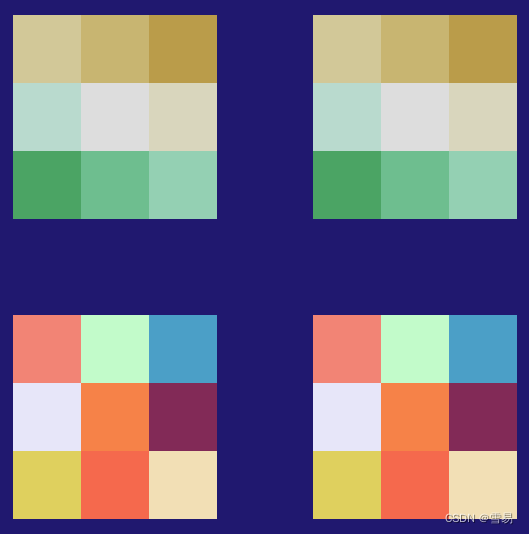【VTKExamples::Visualization】第二期 TestAssignCellColorsFromLUT
2024-01-08 21:47:45
很高兴在雪易的CSDN遇见你?
VTK技术爱好者 QQ:870202403
前言
本文分享vtkPolyData渲染时如何为每个Cell指定一个颜色,希望对各位小伙伴有所帮助!
感谢各位小伙伴的点赞+关注,小易会继续努力分享,一起进步!
你的点赞就是我的动力(^U^)ノ~YO

1. 指定Cell颜色

void ztInteractionApplication::MakeLUT(size_t const& tableSize, vtkLookupTable* lut)
{
vtkSmartPointer<vtkNamedColors> nc = vtkSmartPointer<vtkNamedColors>::New();
lut->SetNumberOfTableValues(static_cast<vtkIdType>(tableSize));
lut->Build();
// Fill in a few known colors, the rest will be generated if needed
lut->SetTableValue(0, nc->GetColor4d("Black").GetData());
lut->SetTableValue(1, nc->GetColor4d("Banana").GetData());
lut->SetTableValue(2, nc->GetColor4d("Tomato").GetData());
lut->SetTableValue(3, nc->GetColor4d("Wheat").GetData());
lut->SetTableValue(4, nc->GetColor4d("Lavender").GetData());
lut->SetTableValue(5, nc->GetColor4d("Flesh").GetData());
lut->SetTableValue(6, nc->GetColor4d("Raspberry").GetData());
lut->SetTableValue(7, nc->GetColor4d("Salmon").GetData());
lut->SetTableValue(8, nc->GetColor4d("Mint").GetData());
lut->SetTableValue(9, nc->GetColor4d("Peacock").GetData());
}
//! Use a color transfer Function to generate the colors in the lookup table.
void ztInteractionApplication::MakeLUTFromCTF(size_t const& tableSize, vtkLookupTable* lut)
{
vtkSmartPointer<vtkColorTransferFunction> ctf =
vtkSmartPointer<vtkColorTransferFunction>::New();
ctf->SetColorSpaceToDiverging();
// Green to tan.
ctf->AddRGBPoint(0.0, 0.085, 0.532, 0.201);
ctf->AddRGBPoint(0.5, 0.865, 0.865, 0.865);
ctf->AddRGBPoint(1.0, 0.677, 0.492, 0.093);
lut->SetNumberOfTableValues(static_cast<vtkIdType>(tableSize));
lut->Build();
for (size_t i = 0; i < tableSize; ++i)
{
double* rgb;
rgb = ctf->GetColor(static_cast<double>(i) / tableSize);
lut->SetTableValue(static_cast<vtkIdType>(i), rgb);
}
}
//! Create the cell data using the colors from the lookup table.
void ztInteractionApplication::MakeCellData(
size_t const& tableSize, vtkLookupTable* lut, vtkUnsignedCharArray* colors)
{
for (size_t i = 1; i < tableSize; i++)
{
double rgb[3];
unsigned char ucrgb[3];
// Get the interpolated color.
// Of course you can use any function whose range is [0...1]
// to get the required color and assign it to a cell Id.
// In this case we are just using the cell (Id + 1)/(tableSize - 1)
// to get the interpolated color.
lut->GetColor(static_cast<double>(i) / (tableSize - 1), rgb);
for (size_t j = 0; j < 3; ++j)
{
ucrgb[j] = static_cast<unsigned char>(rgb[j] * 255);
}
colors->InsertNextTuple3(ucrgb[0], ucrgb[1], ucrgb[2]);
// Print out what we have.
std::cout << "(";
PrintColour<double[3]>(rgb);
std::cout << ") (";
PrintColour<unsigned char[3]>(ucrgb);
std::cout << ")" << std::endl;
}
}
template <typename T>
void ztInteractionApplication::PrintColour(T& rgb)
{
// Don't do this in real code! Range checking etc. is needed.
for (size_t i = 0; i < 3; ++i)
{
if (i < 2)
{
std::cout << static_cast<double>(rgb[i]) << " ";
}
else
{
std::cout << static_cast<double>(rgb[i]);
}
}
}
void ztInteractionApplication::on_assignCellColorsFromLUTAct_triggered()
{
vtkSmartPointer<vtkNamedColors> nc = vtkSmartPointer<vtkNamedColors>::New();
// Provide some geometry
int resolution = 3;
vtkSmartPointer<vtkPlaneSource> plane11 =
vtkSmartPointer<vtkPlaneSource>::New();
plane11->SetXResolution(resolution);
plane11->SetYResolution(resolution);
vtkSmartPointer<vtkPlaneSource> plane12 =
vtkSmartPointer<vtkPlaneSource>::New();
plane12->SetXResolution(resolution);
plane12->SetYResolution(resolution);
// Create a lookup table to map cell data to colors
vtkSmartPointer<vtkLookupTable> lut1 = vtkSmartPointer<vtkLookupTable>::New();
vtkSmartPointer<vtkLookupTable> lut2 = vtkSmartPointer<vtkLookupTable>::New();
int tableSize = std::max(resolution * resolution + 1, 10);
// Force an update so we can set cell data
plane11->Update();
plane12->Update();
MakeLUT(tableSize, lut1);
MakeLUTFromCTF(tableSize, lut2);
vtkSmartPointer<vtkUnsignedCharArray> colorData1 =
vtkSmartPointer<vtkUnsignedCharArray>::New();
colorData1->SetName("colors"); // Any name will work here.
colorData1->SetNumberOfComponents(3);
std::cout << "Using a lookup table from a set of named colors." << std::endl;
MakeCellData(tableSize, lut1, colorData1);
// Then use SetScalars() to add it to the vtkPolyData structure,
// this will then be interpreted as a color table.
plane11->GetOutput()->GetCellData()->SetScalars(colorData1);
vtkSmartPointer<vtkUnsignedCharArray> colorData2 =
vtkSmartPointer<vtkUnsignedCharArray>::New();
colorData2->SetName("colors");
colorData2->SetNumberOfComponents(3);
std::cout << "Using a lookup table created from a color transfer function."
<< std::endl;
MakeCellData(tableSize, lut2, colorData2);
plane12->GetOutput()->GetCellData()->SetScalars(colorData2);
// Setup actor and mapper
vtkSmartPointer<vtkPolyDataMapper> mapper11 =
vtkSmartPointer<vtkPolyDataMapper>::New();
mapper11->SetInputConnection(plane11->GetOutputPort());
// Now, instead of doing this:
// mapper11->SetScalarRange(0, tableSize - 1);
// mapper11->SetLookupTable(lut1);
// We can just use the color data that we created from the lookup table and
// assigned to the cells:
mapper11->SetScalarModeToUseCellData();
mapper11->Update();
vtkSmartPointer<vtkPolyDataMapper> mapper12 =
vtkSmartPointer<vtkPolyDataMapper>::New();
mapper12->SetInputConnection(plane12->GetOutputPort());
mapper12->SetScalarModeToUseCellData();
mapper12->Update();
vtkSmartPointer<vtkXMLPolyDataWriter> writer =
vtkSmartPointer<vtkXMLPolyDataWriter>::New();
writer->SetFileName("pdlut.vtp");
writer->SetInputData(mapper11->GetInput());
// This is set so we can see the data in a text editor.
writer->SetDataModeToAscii();
writer->Write();
writer->SetFileName("pdctf.vtp");
writer->SetInputData(mapper12->GetInput());
writer->Write();
vtkSmartPointer<vtkActor> actor11 = vtkSmartPointer<vtkActor>::New();
actor11->SetMapper(mapper11);
vtkSmartPointer<vtkActor> actor12 = vtkSmartPointer<vtkActor>::New();
actor12->SetMapper(mapper12);
// Let's read in the data we wrote out.
vtkSmartPointer<vtkXMLPolyDataReader> reader1 =
vtkSmartPointer<vtkXMLPolyDataReader>::New();
reader1->SetFileName("pdlut.vtp");
vtkSmartPointer<vtkXMLPolyDataReader> reader2 =
vtkSmartPointer<vtkXMLPolyDataReader>::New();
reader2->SetFileName("pdctf.vtp");
vtkSmartPointer<vtkPolyDataMapper> mapper21 =
vtkSmartPointer<vtkPolyDataMapper>::New();
mapper21->SetInputConnection(reader1->GetOutputPort());
mapper21->SetScalarModeToUseCellData();
mapper21->Update();
vtkSmartPointer<vtkActor> actor21 = vtkSmartPointer<vtkActor>::New();
actor21->SetMapper(mapper11);
vtkSmartPointer<vtkPolyDataMapper> mapper22 =
vtkSmartPointer<vtkPolyDataMapper>::New();
mapper22->SetInputConnection(reader2->GetOutputPort());
mapper22->SetScalarModeToUseCellData();
mapper22->Update();
vtkSmartPointer<vtkActor> actor22 = vtkSmartPointer<vtkActor>::New();
actor22->SetMapper(mapper22);
// Define viewport ranges.
// (xmin, ymin, xmax, ymax)
double viewport11[4] = { 0.0, 0.0, 0.5, 0.5 };
double viewport12[4] = { 0.0, 0.5, 0.5, 1.0 };
double viewport21[4] = { 0.5, 0.0, 1.0, 0.5 };
double viewport22[4] = { 0.5, 0.5, 1.0, 1.0 };
// Set up the renderers.
vtkSmartPointer<vtkRenderer> ren11 = vtkSmartPointer<vtkRenderer>::New();
vtkSmartPointer<vtkRenderer> ren12 = vtkSmartPointer<vtkRenderer>::New();
vtkSmartPointer<vtkRenderer> ren21 = vtkSmartPointer<vtkRenderer>::New();
vtkSmartPointer<vtkRenderer> ren22 = vtkSmartPointer<vtkRenderer>::New();
// Setup the render windows
vtkSmartPointer<vtkRenderWindow> renWin =
vtkSmartPointer<vtkRenderWindow>::New();
renWin->SetSize(600, 600);
renWin->AddRenderer(ren11);
renWin->AddRenderer(ren12);
renWin->AddRenderer(ren21);
renWin->AddRenderer(ren22);
ren11->SetViewport(viewport11);
ren12->SetViewport(viewport12);
ren21->SetViewport(viewport21);
ren22->SetViewport(viewport22);
ren11->SetBackground(nc->GetColor3d("MidnightBlue").GetData());
ren12->SetBackground(nc->GetColor3d("MidnightBlue").GetData());
ren21->SetBackground(nc->GetColor3d("MidnightBlue").GetData());
ren22->SetBackground(nc->GetColor3d("MidnightBlue").GetData());
ren11->AddActor(actor11);
ren12->AddActor(actor12);
ren21->AddActor(actor21);
ren22->AddActor(actor22);
vtkSmartPointer<vtkRenderWindowInteractor> iren =
vtkSmartPointer<vtkRenderWindowInteractor>::New();
iren->SetRenderWindow(renWin);
renWin->Render();
iren->Start();
}结论:
感谢各位小伙伴的点赞+关注,小易会继续努力分享,一起进步!
你的赞赏是我的最最最最大的动力(^U^)ノ~YO

文章来源:https://blog.csdn.net/qq_40041064/article/details/135460452
本文来自互联网用户投稿,该文观点仅代表作者本人,不代表本站立场。本站仅提供信息存储空间服务,不拥有所有权,不承担相关法律责任。 如若内容造成侵权/违法违规/事实不符,请联系我的编程经验分享网邮箱:veading@qq.com进行投诉反馈,一经查实,立即删除!
本文来自互联网用户投稿,该文观点仅代表作者本人,不代表本站立场。本站仅提供信息存储空间服务,不拥有所有权,不承担相关法律责任。 如若内容造成侵权/违法违规/事实不符,请联系我的编程经验分享网邮箱:veading@qq.com进行投诉反馈,一经查实,立即删除!